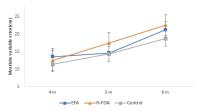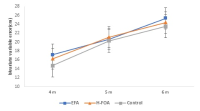Impact of 9-week strength training of racing cyclist candidate during training camp on body composition, racing cyclist specific fitness, and racing cycle performance was examined. Two by two (cyclist experience, y/n and strength training (ST) participation, y/n) experiment design was employed. A total of 20 candidates participated and divided evenly into four groups; 1) experienced cyclist participating ST (CST), 2) non-experience cyclist participating ST (nCST), 3) experienced cyclist no participating ST (CnST), and 4) non-experience cyclist no participating ST (nCnST). Two programs were introduced; 1) non ST containing, pre-existing program emphasizing on sprint and acceleration training and 2) new-program containing ST and sprint and acceleration training. CST and nCST participated the latter program. Before and after the 9-week training, body composition, racing cyclist specific fitness, and racing cycle performance was tested. After 9 weeks, all groups decreased body weight(p<0.05), body fat content(p<0.05), body mass index, and CST and nCST increased lean body mass(p<0.05). Muscular strength measures such as grip strength, low back strength, 1RM of bench press, 1RM of squat, and anaerobic capacity improved after 9 weeks in all groups(p<0.05). The magnitude of changes was greater in order of CST, nCST, CnST, nCnST. Time trial of 200 meter sprint was faster after 9 weeks in all groups except CnST while 500 meter sprint was improved only in nCnST(p<0.05). After 9 weeks, regardless of previous cyclist experience, those who participated in ST ranked high places at racing cycle competition. Both training programs for the candidates improved body composition and racing cyclist specific fitness. When strength training was added to pre-existing training program emphasized on sprint and acceleration, the racing cycle performance was enhanced. Strength training for racing cyclist is highly recommended to improve their racing performance.
The purpose of this study was to examine psychological capital acquisition through Asian Games Participation. 17 of national women football players were completed Psychological Capitals Questionnair. The psychological capital consists of optimism, psychological skills, self-management, collective efficacy, and performance perception was investigated after the team call-ups and before the team-release. The data was analyzed by paired t-test. As results, Korean women football players’ collective efficient and performance perception showed a statistical significance at the beginning of the team call-ups but optimism, psychological skills, and self-direction did not show statistic significances. The team-harmony, interpersonal-management, team-power, sufficient training, trust in coach, efficient communication, and psychological football factors, which were subfactor of football players’ psychological capital, showed statistical significances. However, confidence, concentration, goal-setting, imagery, willpower, anxiety-control, mental-management, life-management, training-management, innate-behavior management, physical-management, football skills, mediative skills, and football intelligence factors did not have statistic significances. These results demonstrate that effects of mega sporting events-like experiences and psychological factors’ variability and inflexibility according to weather changes should be considered when it comes to discussion of psychological factors regarding players’ performance. It is expected that this study would be a fundamental resource for understanding of psychological influences through participations in mega sporting events and discussions about further psychological interventions for teams with environmental consideration as well as methodological developments which could measure effects of the psychological interventions.
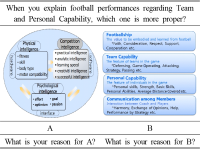
Purpose The following study was conducted to suggest and verify the validity of the concept of team performance, which has previously been considered as the total sum of individual performances. Method The concept of team performance was extracted by a conductive content analysis and an exploratory factor analysis of the data gathered from middle school football players. To verify the validity of the extracted concept, football experts' opinions were collected. Results The idea of team performance, categorized by Footballship, Team Capability, Personal Capability, Communication among Members, has been taken differently from the total sum of individual performances. Footballship is the virtue that should be materialized, and simultaneously earned during the game. Team Capability is a available resource for team's performance, Personal Capability is a available resource for a player's performance, and Communication among Members is the intimacy of communication between coaches and players. The conglomeration of experts' opinions on the concept of team performance and its components shows that team performance is evidently different from the total sum of individual performances. Conclusion The following study has been conducted to suggest and verify the validity of the concept of team performance. Team performance exists, standing distinct from the sum of individual performance, and understanding the concept of team performance will contribute not only to understanding performance, but also to improve the effectiveness of training and managing the team. Interest of the sport society is looked forward to.

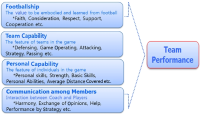
Purpose The purpose of this studied to improve athletes’ performance through sports psychological skills training and counseling of a male canoe player in high school. Methods One male high school athlete in J area was interviewed for sports psychological skills training and counseling, and interviewed athletes and coaches diagnosed the potential psychological problems of athletes. Through this process, the athlete gained the ability to control anxiety about the game and strengthened the attention-focused ability to increase his confidence and set a goal for improving concentration. For effective training, sports psychological counselors, athletes, and coaches met once a week to create a routine. and participated in direct training on a boat with the coach every week. Sports psychological skills, anxiety about competition, and self-management of athletes were measured before and after to confirm the effectiveness of training of athletes' psychological skills. Results As a result, athletes' psychological skills and anxiety decreased, their confidence increased, and their concentration, which was diagnosed as an urgent problem of athletes, improved. Conclusions psychological skills of athletes, psychological shortcomings of players were reinforced, thus enhancing the athletes' performance. This suggests the effectiveness and necessity of training in sports psychological skills. It is hoped that continued support will serve as an opportunity to diagnose potential psychological problems of student athletes and apply them to training to contribute to improving their performance.

This study has been conducted to develop methods and techniques for the analysis of data related to baseball performance using the winning and losing games. The purposes of the study were to examine differences of athlete performance for semi playoff, playoff, and Korean professional baseball series and to develop optimal forecasting model for the short term series. Data used in the study were taken from Korean professional baseball association. Three data sets including semi play off from 1982 to 2012, play off from 1989 to 2012, and Korean series from 1982 to 2012 were used. To compare athlete performance by winning and losing games for short-term series t-test was applied. This study created new parameters by weighted value through the equalization process to calculate skill related variables as a predicted variable. Three predicted models such as discriminant, binary logistic regression and artificial neural network models were developed to clarify the suggested models. The results showed that the number of significant parameters increased as the series continued. In particular, a variable related to error was added as a significant variable at the Korean Series. A third base hit in the play-off and a second base hit were also added as significant parameters in the play-off and the Korean series, respectively. In addition, W/L a major variables affecting a given technology area, the pitching PO, PO, the inertia, KS, the pitching, respectively. An artificial neural network model was finally selected with the highest accuracy and lowest input of estimated parameters in the semi play-off. In the play-off, artificial neural network model that applied technical area parameters by specialist criteria had better accuracy rate than two others. In the Korean series, artificial neural network model that created estimation parameters by applying all parameters was chosen as the final model. When the overall accuracy level of semi-play off, play off and Korean series was figured out, binary logistic regression model had higher accuracy of classification than discriminant model, but artificial neural network model had the higher accuracy of classification than binary logistic regression model.


PURPOSE The purpose of this study was to investigate the characteristics of field and on-ice performances of ice-hockey players and the relationship of performance with subjective joint pain and dysfunction. METHODS A total of 25 male college icehockey players were evaluated for 19 items of performance. Pain and dysfunctions in the lower extremities and lower back were confirmed through the Foot and Ankle Outcome Score, Knee Injury and Osteoarthritis Outcome Score, Hip Dysfunction and Osteoarthritis Outcome Score, and Osweatry Disability Index questionnaire. Players with similar performance characteristics were classified through a cluster analysis, and differences in performance and patient-reported outcomes between clusters were analyzed with a one-way analysis of variance. RESULTS The ice-hockey players were classified into “lower muscular strength and performance (cluster 1),” “lower cardiorespiratory endurance (cluster 2),” and “high muscular strength and performance (cluster 3).” Players in cluster 1 had more frequent ankle and knee joint dysfunctions and pain compared to those in cluster 3. Several performance test items affected the subjective joint score, and the related performance items were more in the proximal joint than in the distal joint. CONCLUSIONS Ice hockey players should perform training to supplement their individual lack of on-ice and field performance. Since performance may be limited because of joint dysfunction and pain, a joint-specific intervention strategy should be applied to improve physical and athletic performances.
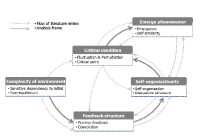
Purpose This study was aimed at interpreting the football talent development stages based on complexity theory. Methods The data for this study was gathered through literature review and in-depth interviews that were analyzed by thematic analysis. Literature review of the studies regarding complexity theory revealed the features of complexity theory and five football players participating in the K-league were interviewed. Gathered materials were analyzed by the thematic analysis. Initial codes and potential themes of football talent development stages, the conception and potential themes of the complexity theory were interpreted by metaphorical analysis. Results Results of literature review were as follows: analysis frame of complexity theory were organized environment of complexity, feedback structure, self-organization, critical condition and emergent phenomenon. The football talent development stages, interpreted as a result of literature review, were divided into Potential Talents, Excellence based Talents Development, Footballizational Talents, Football to Takeoff and Personalization of Football Talents. The stages were specifically materialized as follows: Potential Talents was materialized into physical condition, physical activity preference and change of environment. Excellence based Talent Development was materialized into skill mastery, thoughts about football and relationship with significant others. Footballizational Talents was materilized into skill fractionation, football flow and growth experience. Football to Takeoff was materialized into overcoming crisis experience, performance scaffolding and performance takeoff. Personalization of Football Talents was materialized into manifestation of performance personalization, performance evolution, condition maintenance. Conclusion Football talent development stages, interpreted by means of complexity theory, were divided into Potential Talents stage, Excellence based Talent Development stage, Footballizational Talents stage, Football to Takeoff stage and Personalization of Football Talents stage. Utilization of this study as a fundamental resource of football talents development programs and as a means to understanding football talents development is looked forward to.

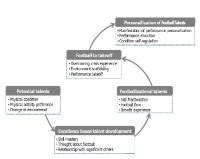

Purpose The purpose of this study was to investigate the badminton players psychological disturbance and coping strategies types and characteristics. Methods To achieve the purpose of this study, an open-ended questionnaires were used targeting 194 badminton players, 25 Q samples were selected by collected data as the self – statement. Q samples were classified depending on their subjective experience by P samples composed of active badminton players who had more than eight years of athletic career; this data were coded and analyzed by VARIMAX rotation. Results The results revealed by the Q methodology were below. First of all, the first type is named as (Internal Disturbance - Passive Coping) type. The first type is psychologically disturbed by internal factors, and negative about external coping strategies. Second, the second type showed the higher awareness of coping strategies than the other types; It was named as (Active Coping) type. Third, The third type recognized the burden of victory and self-confidence, and it was named as the type of (Victory Obsession). Conclusion In the badminton competition, the deterioration of concentration and judgment ability because of psychological disturbance has a serious effect on the performance. Therefore, based on the results of this study, it will be possible to improve the performance by appropriate psychological intervention through the characteristics of the athletes.


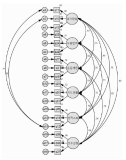
This study was to explore and confirm factors of sport psychology counseling needs in Korean elite coaches. In order to achieve this purpose, 56 elite coaches in Korean Olympic training center at Taereung and Jincheon responded on open-questionnaire and 260 coaches responded on survey. Open-ended questionnaire responses were analyzed by inductive content analysis and collected survey data were analyzed by exploratory factor analysis and confirmatory analysis. The results were as follows: Firstly, sport psychology counseling needs of elite coaches were competition preparation, negative athlete-coach relationship, athlete private problems, performance degradation, pressure on performance result, injury management, team cohesion degradation, motivation, training management, different gender athlete control, athletes drop out, pressure from outside, conflicts with colleagues, neglecting from athletes, feeling of incompetence, emotional control problem, and so on. Secondly, based on these responses, closed-ended questionnaire was developed, surveyed, and analyzed. Exploratory factor analysis illustrated that sports counseling needs of coaches were performance enhancement strategies, unreasonable pressure, negligence on training, coaching stress, competition result stress, conflicts with athletes. Finally, confirmatory factor analysis showed that construct of sport counseling needs illustrated appropriate fit indices values. The results of this study contributed to provide fundamental information on coaching education program and sport psychology counseling program development and application. Consequently, it will help coaches to control their mind at coaching in training and competitions.


Purpose The purpose of this study is to investigate the effectiveness of the holistic focus of attention(H-FOA), presented as an alternative attention concept, to explore effective attention focus for the skilled performer. Methods KPGA's experts (N = 24) were selected and randomly assigned to external focus, overall focus and control groups. Experiments were conducted in the putting competition of the target distance (4m, 5m and 6m). Performance was measured for accuracy. Results Interestingly, the control group showed the high putting performance accuracy (MRE). In addition, the holistic focus of attention group was able to identify performance similar to the control group. The effect of external attention focus could not be confirmed. Conclusions Results of this study indicate that external focus may be unnecessary for skilled golfers. Rather, holistic focus of attention is highlighted for the improvement of players’ attentional focus under pressure.


